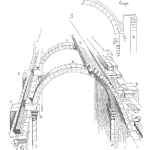
In the last video on stress-strength interference, we have seen the analytical method. This has limitations and often cannot be used in real life problems in reliability prediction. For example, velocity of windmill may have Weibull or lognormal distribution, elevators may have particular application load cycles which can only be modelled using empirical distributions. In such situations, we need to use Monte Carlo Simulation using various other distributions. I will discuss and explain this technique in this video.
[Read more…]





 Ask a question or send along a comment.
Please login to view and use the contact form.
Ask a question or send along a comment.
Please login to view and use the contact form.